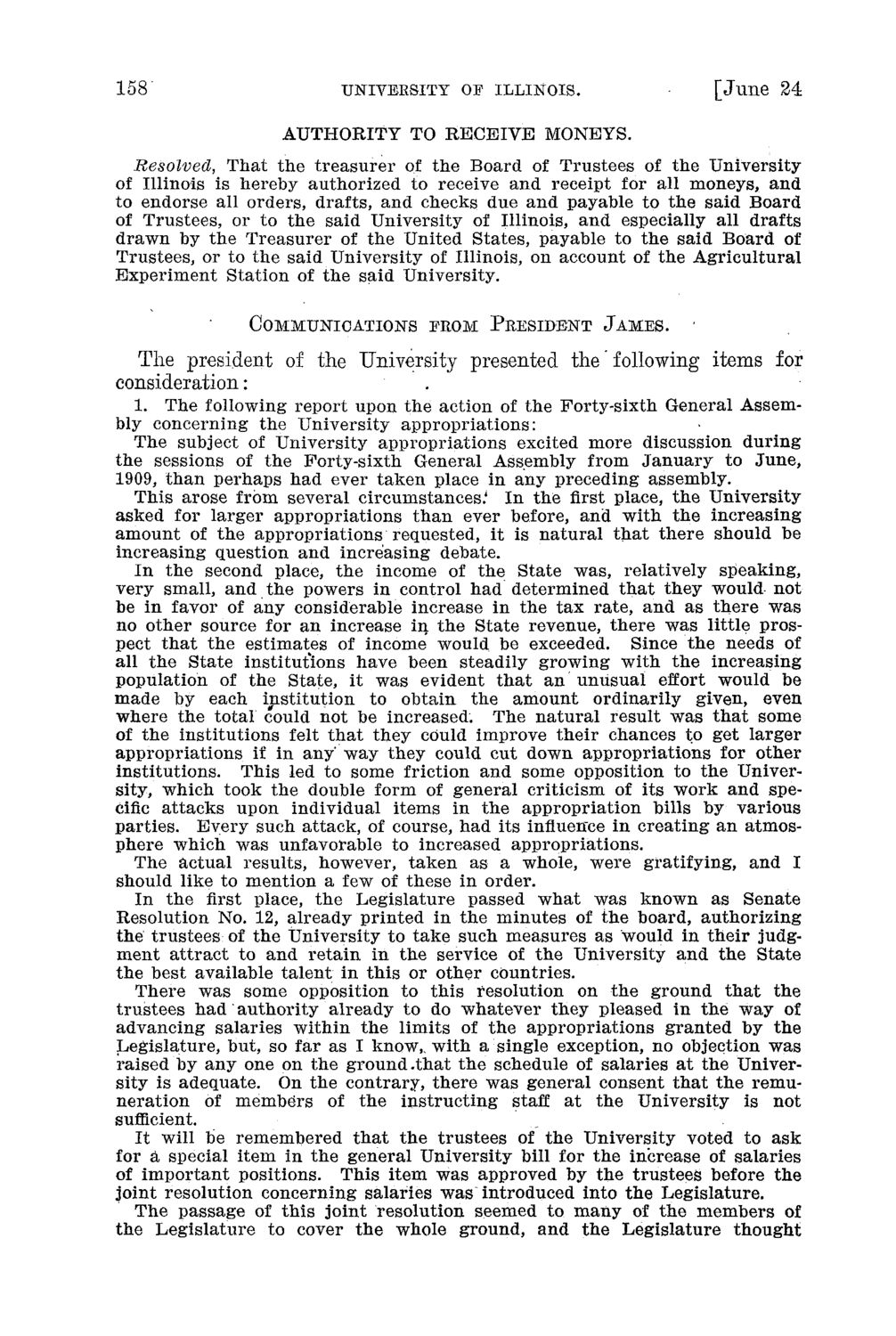| |
| |
Caption: Board of Trustees Minutes - 1910
This is a reduced-resolution page image for fast online browsing.

EXTRACTED TEXT FROM PAGE:
158 UNIVERSITY OF I L L I N O I S . [June 24 AUTHORITY TO RECEIVE MONEYS. Resolved, That the treasurer of the Board of Trustees of the University of Illinois is hereby authorized to receive and receipt for all moneys, and to endorse all orders, drafts, and checks due and payable to the said Board of Trustees, or to the said University of Illinois, and especially all drafts drawn by the Treasurer of the United States, payable to the said Board of Trustees, or to the said University of Illinois, on account of the Agricultural Experiment Station of the said University. COMMUNICATIONS FROM P R E S I D E N T J A M E S . • The president of the University presented t h e ' following items for consideration: 1. The following report upon the action of the Forty-sixth General Assembly concerning the University appropriations: The subject of University appropriations excited more discussion during the sessions of the Forty-sixth General Assembly from January to June, 1909, than perhaps had ever taken place in any preceding assembly. This arose from several circumstances.' In the first place, the University asked for larger appropriations than ever before, and with the increasing amount of the appropriations requested, it is natural that there should be increasing question and increasing debate. In the second place, the income of the State was, relatively speaking, very small, and the powers in control had determined that they would not be in favor of any considerable increase in the tax rate, and as there was no other source for an increase in the State revenue, there was little prospect that the estimates of income would be exceeded. Since the needs of all the State institutions have been steadily growing with the increasing population of the State, it was evident that an unusual effort would be made by each institution to obtain the amount ordinarily given, even where the total could not be increased. The natural result was that some of the institutions felt that they could improve their chances to get larger appropriations if in any* way they could cut down appropriations for other institutions. This led to some friction and some opposition to the University, which took the double form of general criticism of its work and specific attacks upon individual items in the appropriation bills by various parties. Every such attack, of course, had its influence in creating an atmosphere which was unfavorable to increased appropriations. The actual results, however, taken as a whole, were gratifying, and I should like to mention a few of these in order. In the first place, the Legislature passed what was known as Senate Resolution No. 12, already printed in the minutes of the board, authorizing the trustees of the University to take such measures as would in their judgment attract to and retain in the service of the University and the State the best available talent in this or other countries. There was some opposition to this resolution on the ground that the trustees had authority already to do whatever they pleased in the way of advancing salaries within the limits of the appropriations granted by the Legislature, but, so far as I know,, with a single exception, no objection was raised by any one on the ground .that the schedule of salaries at the University is adequate. On the contrary, there was general consent that the remuneration of members of the instructing staff at the University is not sufficient. It will be remembered that the trustees of the University voted to ask for a special item in the general University bill for the increase of salaries of important positions. This item was approved by the trustees before the joint resolution concerning salaries was introduced into the Legislature. The passage of this joint resolution seemed to many of the members of the Legislature to cover the whole ground, and the Legislature thought
| |